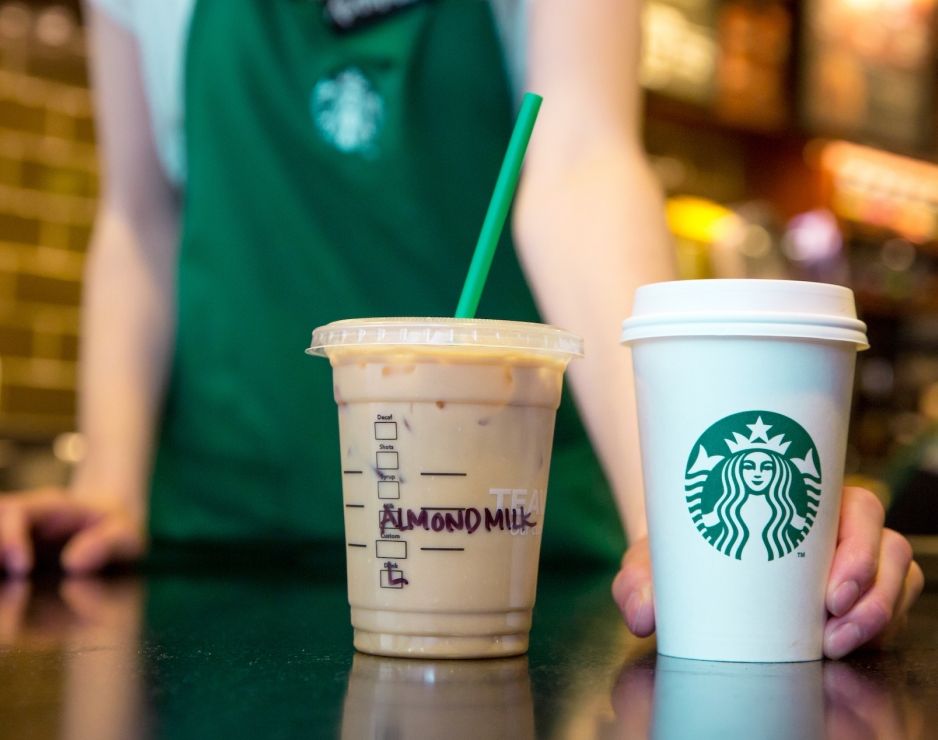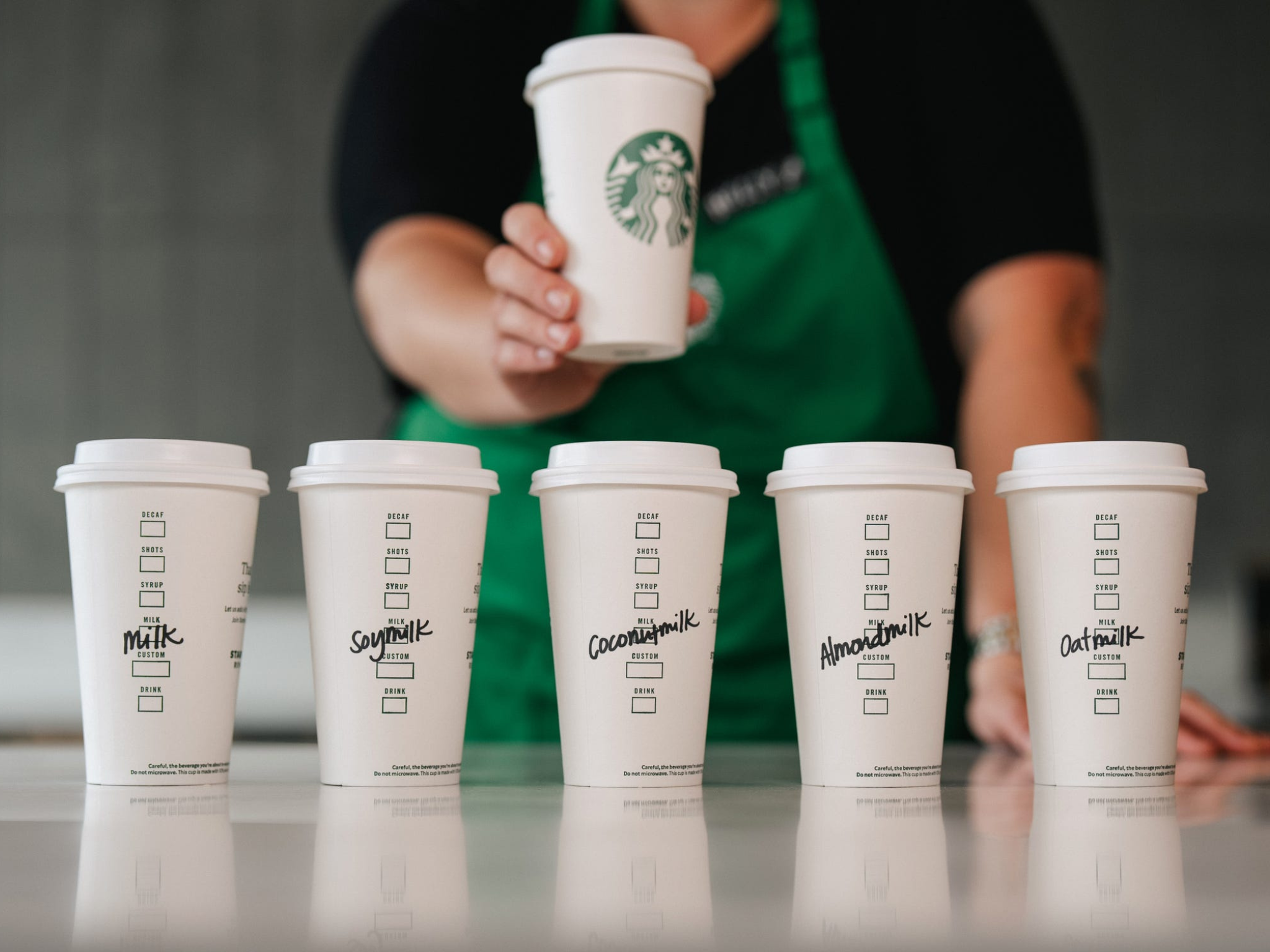At Long Last, Non-Dairy Milk is Free at Starbucks As New CEO Looks to Turn A New Leaf
6 Mins Read
Coinciding with the holiday season, Starbucks has permanently scrapped its surcharge for dairy-free milks like oat and almond in the US and Canada.
Starbucks has announced that it is removing the infamous non-dairy surcharge from its drinks in the US and Canada starting November 7, when it will launch its holiday menu.
It means consumers won’t have to pay extra to switch from dairy to plant-based milk in the home market of the world’s largest coffee chain, after years of campaigning by activists.
The move comes months after Starbucks was hit with a disability discrimination lawsuit for the surcharge, with customers arguing that choosing oat milk shouldn’t be viewed as a chargeable customisation, but as a necessity for the large number of Americans who are lactose-intolerant or have dairy allergies.
The coffee chain acknowledged that substituting dairy-free milk is the second most-requested customisation from its customers, behind only an extra shot of espresso. When the surcharge is scrapped, customers can expect to save more than 10% on the cost of their beverage at company-owned stores.
Announced on the company’s Q4 earnings call, it follows several months of financial turbulence for the company – its global sales dropped by 6% between July and September (compared to the same period last year). Moreover, its earnings per share fell by 25% year-over-year.
New CEO Brian Niccol, who took over from Laxman Narasimhan in August, said the decision to scrap the additional charge – which went as high as 90 cents in some cities – was part of his Back to Starbucks strategy, which involves simplifying the menu and fixing its pricing architecture.
“We know customisation is an important part of the Starbucks experience, and we want to make it easier for customers to order their beverage just the way they want while still feeling like it’s worth it,” Niccol said in a call to investors.

Starbucks finally gives consumers what they want
Starbucks was one of the first coffee chains to introduce a non-dairy option for customers, offering soy milk since 1997. But while it has stopped charging extra for plant-based milks in markets like the UK, China, Argentina, France, Belgium and the Netherlands, its home country has been an outlier.
But there are several problems with that. First, plant-based milk is much better for the environment than dairy, whether that’s in terms of greenhouse gas emissions, water consumption, or land use. In fact, Starbucks has admitted that cow’s milk is the biggest contributor to its carbon footprint.
The company has set a net-zero goal for 2050 and is aiming to halve its emissions by the end of this decade. And while it has made some major strides in safeguarding the uncertain future of coffee and its farmers, its carbon footprint actually increased by 8% in the latest fiscal year – so encouraging consumers to swap dairy for oat, almond, soy or coconut milk feels like a no-brainer for its climate goals.
And then there’s the fact that lactose intolerance and milk allergies are considered disabilities in the US. At least 12% of Americans are intolerant to lactose, and over 5% (15 million) have a milk or dairy allergy. One estimate claims that between 80-90% of African Americans, Native Americans and Asian Americans are lactose-intolerant.
At the same time, Gen Zers say they’re are ashamed to order conventional dairy in public, and Gen Alpha – tipped to be the largest generation in history – will be the first majority-minority demographic in the US, likely increasing the demand for plant-based milk and climate-friendly offerings.
Meanwhile, dairy consumption in the US recently hit an all-time low, and plant-based milk is becoming more and more popular, taking up 15% of the overall milk market in 2023. More than two in five (44%) of Americans have bought non-dairy milk, and once they try it, 79% purchase it again.
So for Starbucks to make plant-based milk a free option feels like a no-brainer. It’s a major win for activism groups like PETA and Switch4Good, which have been campaigning against the surcharge for years. In fact, PETA has presented proposals to the coffee giant’s annual shareholder meetings, asking them to vote on removing the alt-milk tax.
“Starbucks claims that expansion of its vegan offerings is part of its commitment to give more than it takes from the planet and empower customers. But charging up to 90 cents extra for them doesn’t ’empower’ customers – it penalises them,” Jacqueline Sadashige, PETA’s manager of corporate responsibility, told Green Queen after her shareholder presentation in March.
Removing the dairy-free surcharge ‘the right investment’ for Starbucks
Starbucks had rejected PETA’s call at the time, with 95% of shareholders voting against the proposal. “In some geographies, market conditions allow us to price plant-based milk more closely to dairy milk than in others,” the company said at the time.
“We have long been committed to giving more than we take from the planet and to expanding our plant-based menu items. As with all product offerings, we continuously evaluate the market for, and the price of, our plant-based menu items, including plant-based milk customisations.”
Now, though, Starbucks’s new leadership has had a change of heart. “I made a commitment that we’d get back to Starbucks, focusing on what has always set Starbucks apart – a welcoming coffeehouse where people gather and we serve the finest coffee handcrafted by our skilled baristas,” said Niccol.
“I’ve just seen time and time again, when people start the process of their beverage, the price is warranted given the calibre of the coffee or the drink that you’re getting. Where we sometimes get twisted is in all the different customisations that we offer up, and then the complexity of the customisation that people take us up on. And I think a lot of it is unnecessary,” he told investors.

“When we simplify that aspect of it and then charge for the things that we should be charging for and maybe not charging for the things that don’t really need to be charged for, I think everybody is going to walk away feeling a lot better about ultimately their personal beverage that they’ve created,” he added.
The CEO indicated that absorbing the extra cost of plant-based milk instead of passing it to the customer would have implications for its bottom line, but said he’s “confident it’s the right investment in the business to get people to reengage with the brand accordingly”.
The change comes as Starbucks faces continued losses in its two biggest markets, the US (a 7% decline in sales) and China (a 14% drop). In the latter country, it has been challenged by Luckin Coffee, which overtook Starbucks as the largest coffee chain. With Luckin – which played a huge role in popularising oat milk in China – now preparing to enter the US, it represents a fresh threat to Starbucks’s waning sales.
Abolishing the alt-milk tax will help Starbucks retain and regain customers at a time when the cost-of-living crisis continues to bite hard. It is rolling out a number of other changes too, including the return of Sharpies and the condiment bar, and a promise of no price hike during the 2025 fiscal year.



